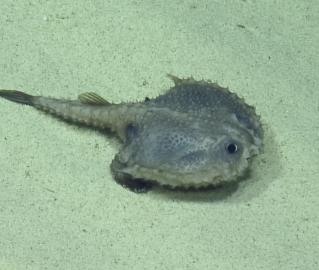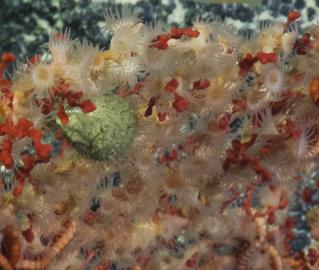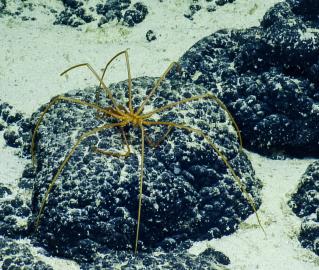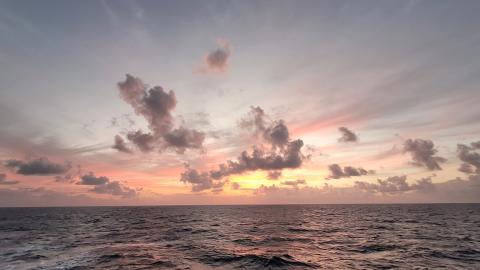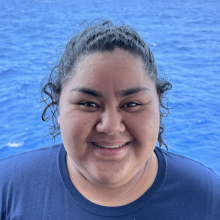
Anneliese Haleck
Tell us about your work/research. What kinds of things do you do?
I teach high school students about Marine Science/Biology. My main focus would be educating students about the importance of not only our oceans in general but coral reef ecosystems, focusing on American Samoa. I was a part of QUEST (Quantitative Ecological Surveying Technique). In Quest, we would dive into certain areas of American Samoa to collect data on species abundance, coral, algae, or fish through the use of quadrants. Prior to participating, I was required to do the swimming test and species ID exam. Recently, I've been involved in cleanups in which I assist in classifying trash as our islands are seeing an increase in pollution in many areas. I tie my projects into my lessons and try my best to involve my students as part of my curriculum. In this way, our students see firsthand at how we directly impact our coral reefs.
What sparked your initial interest in your career?
My initial interest began as a child. My mom and dad both loved to fish. My mom took us reef fishing almost every other Saturday during low tide. On the other hand, my dad took me out on our boat to go deep-sea fishing. I was enthralled by the different organisms I came in contact with. I was excited yet terrified at the same time as a child. Naturally, I was curious. After graduating from Tafuna High School, I saw the opportunity to study Marine Science when I got to our community college and so, I took it. After taking a few classes, I realized I was so captivated because the field was adventurous and challenging at the same time. I needed to be a part of it because my people and the entire culture were centered around the ocean. It was baffling to me to realize just how little we know about our oceans even when there is already so much research being published. We are barely scratching the service of what we know about our oceans.
Who influenced you or encouraged you the most?
My parents and my first marine science instructor Mr. Jameson Newtson were really encouraging. My parents offered a ton of support even during internships. Mr. Newtson challenged me to step out of my comfort zone. He always pushed me to be a part of new opportunities and made learning marine science such a joy through the good & bad.
What element of your work/study do you think is the most fascinating?
There are two fascinating things I have done in this field. One story: There is a village named Fagasa. It has a large bay. it is shark infested. My National Park Service Mentor instructed me to swim from the shore to where their boat was anchored at the entrance of the bay. It was terrifying. However, I jumped in and completed my task. In the end, he said he was testing to see if I could get out of my head and fight my fear. Second, was a summer internship my twin sister and me with Mr. Newtson were tracking currents in the Pago harbor; also a shark-infested area. We deployed our trackers ourselves on our kayaks. It was amazing seeing the data we collected at the end of our day.
What other jobs led you to your current career?
I had great opportunities that encouraged me to pursue studying marine science and eventually led me to my current position: I interned with Marine Science at our local community college (American Samoa Community College). I also assisted with the National Park Service in their initiative to control the number of crowns of thorns around our island, I participated in QUEST, studying different algae and coral species in American Samoa. Through quest, I was taught how to properly collect and input data. I learned how coral bleaching affects not only our oceans but also us. Through science, I gained the skills, confidence, and leadership skills that allowed me to be a part of different programs/organizations.
What are your degrees and certifications?
Marine Science-American Samoa Community College
QUEST Certified-Quantitative Ecological Surveying Techniques
What are your hobbies?
I enjoy snorkeling. Ocean is my therapy. I enjoy painting/sketching. I love outdoor activities such as stargazing, camping, bonfires, etc. I enjoy reading as well as engaging in conversations. I also love to cook and bake; I enjoy learning and gaining knowledge. I find learning fascinating. I enjoy new experiences.
What advice would you give someone who wants to have a career like yours?
If you wish to go into the field of marine science, you need to step outside of your comfort zone. you will get nowhere and you will not reach your goal if you stay where you are comfortable. Learning is not boring, how you learn is up to you. people are one of your greatest assets. Be a sponge and learn from people who have more experience than you. Do not be afraid to speak up.
There is more to marine science than just studying fish. Open your mind up to new possibilities and discard what you think you already know because new information is learned every day.
How did you get involved with the Ocean Exploration Trust?
I applied for the program after I received an email and learned about it from Isabel Gaoteote Halatuituia with the National Marine Sanctuary of American Samoa.
Expeditions
Anneliese participated in the following Ocean Exploration Trust expeditions:
